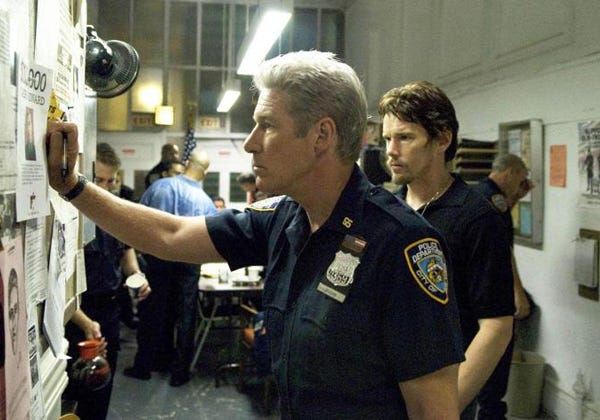Brooklyn's Finest

After watching an amped-up police thriller as a kid, perhaps you’d slowly walk down the hallway, form a two-handed gun out of your thumbs and forefingers and imitate a cop’s pivot-and-pop shooting stance.
With respect to credited law-enforcement consultants, “Brooklyn’s Finest” feels about as authentically dangerous as that scenario. Its street-life story about troubled cops is embarrassingly simplified for audiences lured in by Richard Gere’s presence, and brief appearances of “The Wire” luminaries like Michael Kenneth Williams (Omar), Hassan Johnson (Wee-Bey) and Isiah Whitlock (Sen. Clay Davis) only enforces that “Finest” couldn’t hold that series’ jock.
“Finest” also might dry up the teat Antoine Fuqua has milked since directing Denzel Washington in an Oscar-winning performance in 2001’s “Training Day.” Fuqua has a keen, but often undervalued, eye for bloody, visceral action — “Shooter,” his director’s cut of “King Arthur,” “The Replacement Killers” — but he’s out of his element wandering into Sidney Lumet’s turf.
Trailers made this look like “Training Day: East Coast.” That would vastly improve upon this shapeless, shamelessly clichéd 140-minute mess with underlines and exclamation points on its title’s irony.
Consider how screenwriter Michael C. Martin introduces Gere’s Eddie Dugan, one of three main characters in this melodramatic (c)opera. Waking in a cold sweat from an indeterminate nightmare? Check. Reaching straight for a morning cup of whiskey sunshine? Check. Putting his service revolver in his mouth to pull the trigger on an empty chamber? Yep.
Gere does all he can with Dugan, a bitter, cynical beat cop who’s marking time to retirement and railing against newbie naïveté. But then Martin contorts someone convincingly world-weary … into a john who believes his hooker loves him. “Pretty Woman,” this isn’t.
Meanwhile, Don Cheadle is Clarence “Tango” Butler, a cop so deep undercover that the magnetic drug-trade brotherhood has futzed with his moral compass and jeopardized his shot at a detective slot. His last assignment is taking down Caz (Wesley Snipes), a kingpin who saved Tango’s life during a staged stint in the slammer. (It’s nice to see Snipes back on a screen measured in feet, not inches, but his mellowed-out version of Nino Brown with a rat-tail merely becomes a cog of the plot.)
Cheadle emerges as the only unscathed performer — although he more skillfully tread similar ground in 2008’s far-superior “Traitor.” He’s the only one capable of oppressive gloom and unintentional laughs, at one point telling Ellen Barkin’s ice-queen Fed to, “Step off, dude.” (Given that she looks like Mickey Rourke’s drag-queen version of Ellen Barkin these days, his quip isn’t so far off.)
And of all the actors to play a head-knocker named Salvatore Procida, Fuqua chose … Ethan Hawke? With a passel of kids at home and twins on the way, Sal needs money for a house that doesn’t have moldy wood rotting his asthmatic wife’s lungs. He’d rather it not be the $100,000 she’d get upon his line-of-duty death, so he turns to stealing drug money, to the chagrin of his partner (Brían F. O’Byrne).
King Kong had nothing on Washington’s Alonzo in “Training Day.” Comparatively, Hawke’s Sal is as hard-assed as a baby gorilla cradled in Dian Fossey’s arms. Hawke’s sweat-soaked shouting seems more like a soccer dad about to get red-carded than a volatile cop. Sal’s conflict is compelling, but Hawke’s disappointing characterization rings false.
Naturally, a series of convolutions allow these three characters to converge, in the final act, on what seems to be the one building in all of Brooklyn where bad things are currently happening.
Nearly every scene in “Brooklyn’s Finest” drags on 30 to 45 seconds longer than necessary. Patrick Murguia’s camera fixes itself on driveways to watch cars drive down the street to them or on chairs to which people walk across very long rooms. Even a “Macbeth”-allegory scene of Hawke’s Catholic Sal washing bloody hands draws out to boring-catechism length. It’s as if Murguia set his camera to automatically pan or push in and left, opting instead to shoot the breeze at a nearby catering cart.
Such patience would be fine if Fuqua generated malevolence or let suspense linger as in “Training Day.” (That bathtub scene with Hawke? Yeesh.) Here, it pads 90 predictable minutes of story into something nearly an hour longer, en route to a conclusion with the most laughs at a body count since “Penn and Teller Get Killed” and a freeze-frame that couldn’t be more ridiculous if Burt Reynolds cackled over it.


